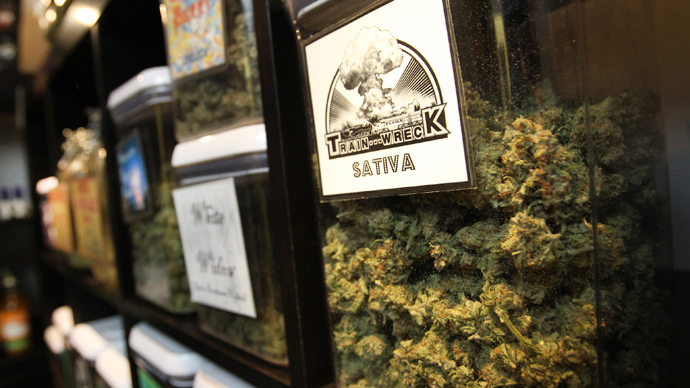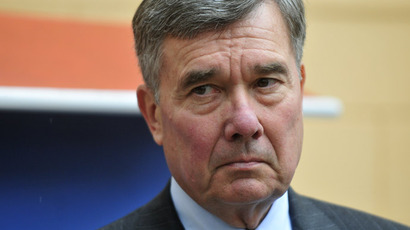Illinois becomes 20th state to legalize medicinal marijuana as reform continues

Marijuana has been legalized for medicinal use in Illinois, making it the twentieth state in the US that permits individuals with serious diseases, including HIV and multiple sclerosis, to buy the drug in limited quantities.
The law, signed Thursday, goes into effect on January 1, 2014 and enacts regulations considered to be among the toughest used by states that have legalized medical marijuana. Patients, after being issued a state identification card, will be allowed to purchase up to 2.5 ounces of marijuana every two week period. There will also be 22 cultivation centers located throughout Illinois, where plants will be grown.
Illinois patients will not be allowed to grow their own marijuana, which is allowed in other states, and the cultivation centers will be under 24-hour surveillance. Medical marijuana users from outside the state will not be allowed to use their ID to buy it in Illinois, an unusual rule among the other states.
Marijuana can help relieve symptoms from cancer, muscular dystrophy, lupus, and over 30 other illnesses. The drug is known to combat insomnia, lack of appetite, general pain, movement disorders, glaucoma, and vomiting, among other maladies.
“It’s important we do whatever we can to ease their pain,” said Governor Pat Quinn as he signed the bill into law at the University of Chicago. “The reason I’m signing the bill is because it is so tightly and properly drafted.”
Today I signed The Compassionate Use of Medical Cannabis Act to help those #IL residents who suffer from debilitating medical conditions.
— Governor Pat Quinn (@GovernorQuinn) August 1, 2013
Patients suffering from a variety of injuries, ranging from military wounds to the physical deterioration that comes with old age, have complained of prescription pill cocktails that leave them groggy and unable to function.
Mike Graham, whose old football injury morphed into spinal problems that confined his life to a bed, was on hand when Governor Quinn signed the law on Thursday. He admitted to the Chicago Tribune that he was hesitant to try marijuana to fix the pain because of the stigma that came from living in a family of police officers.
“In a matter of days, I started to feel better. I could keep food down,” he said. “I thought, ‘Oh, boy, what am I going to say at Thanksgiving? But then they noticed that I could eat, so they knew something was up…I hadn’t been there the three previous years because I wasn’t able to get out of bed.”
Marijuana acceptance has quickly spread throughout the US. New Hampshire legalized marijuana for medicinal use in July, becoming the 19th state nationwide and ending its time as the final holdout in the New England region.
Since Colorado and Washington State voted in favor of laws decriminalizing the recreational use of marijuana, though, there have been signs of resistance from the federal government. Marijuana remains listed as a Schedule I drug on the federal level, which trumps state law whenever the two are in conflict. Under the Controlled Substances Act, marijuana remains classified with the likes of heroin and MDMA.
As a Schedule I drug, the national government claims “the drug or other substances has no currently accepted medical use in treatment in the United States.” Because of that listing, scientists are prevented from testing any medical benefits marijuana may have, a contradictory legal technicality that has frustrated critics for decades.
Despite a promise from US President Barack Obama that the Drug Enforcement Agency would not enforce federal law where states voted in favor of marijuana, the DEA quietly launched four simultaneous raids in Washington State last month. The confusion was palpable in an article written by the editorial board of the Seattle Times.
“At the time, the DEA said the dispensaries were selling to non-patients and trafficking in illegal amounts…If there are to be raids, arrests and prosecutions, they should be done under state authority unless there is evidence of a multistate enterprise,” the Seattle Times wrote.
“The Obama administration should accept state authority over cannabis that does not cross state lines and allow the reform of marijuana prohibition to proceed.”














